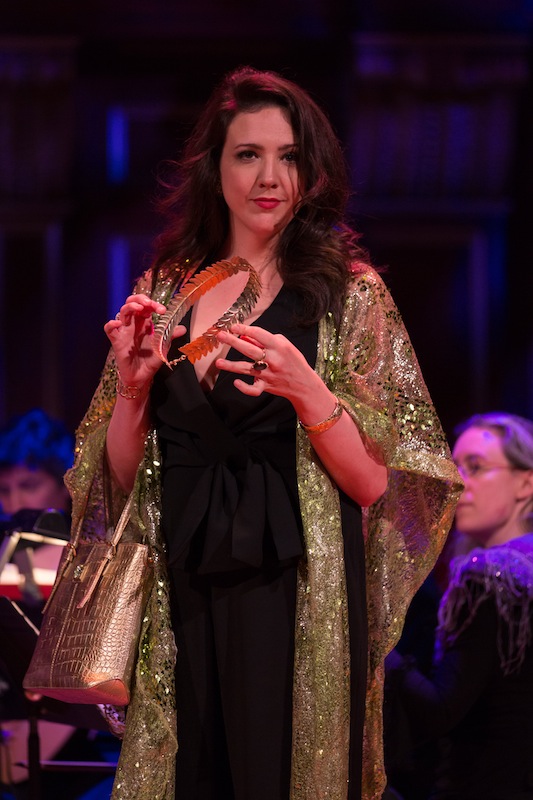A magnificent Susanna Phillips leads an excellent cast in Boston Baroque’s “Agrippina”

Susanna Phillips stars in the title role of Handel’s “Agrippina” for Boston Baroque. Photo: Kathy Wittman
Boston Baroque ended its season Friday evening with a superb, intimate production of Handel’s Agrippina. The first of Handel’s operatic masterpieces and the work that catapulted him into fame and success, Agrippina thrives on sparkle and wit. The work skewers its characters, but everything is leavened with genuine emotion and intelligence. Boston Baroque captured the work’s elusive, challenging style and presented it with thrilling panache.
Agrippina lives and dies on the strength of its title role, the Roman empress who schemes to have her son, Nero, inherit the throne. (Those familiar with Roman history will know that Agrippina’s plans for Nero were not made with the welfare of the empire in mind.) Susanna Phillips was magnificent as Agrippina. Her empress is a believable combination of sophisticated aristocrat, sensual manipulator, and worrywart mother. What makes her dramatic interpretation work is that she lets us see the stress and anxiety just under the surface.
Vocally, Phillips was consistently excellent. Though she doesn’t deliver Handel’s fioratura as fast as she might, her soprano easily fills Jordan Hall, and her phrasing is deeply intelligent and musical. Her vocal portrayal is the sort that would leave a keen impression even without seeing her on stage. A standout was her rendition of “Pensieri, voi mi tormentate,” in which, in the dark hours of the night, Agrippina is suddenly terrified by her own actions—a musical antecedent to Lady Macbeth. In one memorable moment, Phillips thins her voice into a wandering thread, like the insidious thoughts that trouble her.
David Hansen turned in an excellent portrayal as Agrippina’s son, Nero. His Nero is the prototypic hormonal teenager boy—cocky, deeply insecure, and so full of energy as to seem borderline insane. It’s easy to extrapolate the kind of crazy despot he would become. The role of Nero has little meat on it until the last act, in which Hansen practically exploded. A highlight was his seduction attempt of Poppea (who is also being pursued by his father, Claudius), “Coll’ardor del tuo bel core.” There, he urged his shining countertenor to incredible speeds and deftly used Handel’s virtuoso to portray Nero’s mania.
Kevin Deas was a fine Claudius. His plush bass-baritone was perfect for the powerful but aging emperor. One of the pleasures of the opera is how nimbly it satirizes its characters, and Claudius is one such casualty. Deas’s Claudius seems stalwart and imperial at first, but he is quickly revealed to be a lusty old man, obsessed with Poppea.
Although Agrippina seems at first a one-woman show, two women form its axis. Amanda Forsythe’s Poppea is the “other woman,” who has the enviable position of being pursued by Claudius, Nero, and the military general and presumptive heir Otho all at once. Forsythe’s agile soprano, with crystalline staccati, was perfect for portraying Poppea’s lighthearted and empty-headed gaiety. But as the opera progresses and Poppea experiences betrayal, she matures, and Forsythe’s performance deepens. Especially effective were her duets with Otho, her true love. (Interestingly, in this early opera, Handel follows does not frequently have voices heard together in ensembles. But there is still a sense of intimacy between characters.)
Otho is the only truly moral character in the ensemble. First promised the throne, then denounced a traitor and deprived of his love, he seems to be suffering nonstop. All he truly wants is Poppea’s affections. Compared to the other characters, who brim and sparkle with ambition and hypocrisy, Otho does seem a little dull, but Marie Lenormand delivered a heartfelt portrayal. Her mezzo, though one of the quieter voices of the evening, was sheathed with warmth even in the lowest regions of her voice.
Krista River and Douglas Williams rounded out the principles as Narcissus and Pallas, two of Agrippina’s cronies. River provided a warm and fluid mezzo, and Williams an ample bass-baritone, as well as the good looks to convince as Agrippina’s sometimes paramour. Baritone Mark McSweeney was solid in the small role of Lesbos, Claudius’s henchman.
Sharing the stage with his singers, Martin Pearlman gave an excellent reading of the score, always in sympathy with his singers and never letting a moment sag. Boston Baroque consistently delivers performances that unite attention to period practices with fresh and engaging performances.
Handel’s Agrippina will be repeated 7:30 p.m. Saturday at New England Conservatory’s Jordan Hall. http://www.bostonbaroque.org/
Posted in Performances




